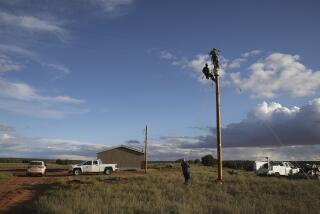Pride, Ignorance, Lack of Transportation Keep Them From Doctor : Rural Poor Dying of Curable Illnesses in Mississippi
- Share via
MENDENHALL, Miss. — Being poor and isolated in the country can be fatal.
Diabetes and high blood pressure can be controlled, and even certain kinds of cancer are curable. And yet Dr. Dennis Adams sees patients, time and again, whose cases are too far advanced by the time they visit the tiny clinic where he works.
“They die of curable diseases,” he said.
Sometimes, the reason they get no preventive care is ignorance. More often, pride keeps the rural poor away; they know they can’t pay. Sometimes, it is just the lack of a ride.
“People don’t decide to get sick on the day that the bus is coming through,” said Adams, who was reared in a New York housing project and followed what he describes as a missionary calling when he moved to this country town half an hour south of Jackson nearly 12 years ago.
No Charge for Penniless
The clinic charges as little as $5 for an office visit--no charge for those who can afford nothing--and relies partly on samples provided by drug companies, partly on sympathetic pharmacists, to ensure that patients get medicine.
It is part of the Mendenhall Ministries, a collection of church-affiliated projects ranging from literacy training to medical help that are based in prefab and brick buildings in an otherwise forgotten part of town. Scruffy dogs roam past junk cars and little “shotgun” houses with sagging porches and siding coming off.
Freehand signs on the road leading into Mendenhall advertise: “Boiled peanuts” and “Sweet potatoes, $8.50 a bushel.”
Most of Adams’ patients are black, like himself. The clinic’s five doctors see about 500 people a month.
Around the nation, about 125 rural general hospitals have closed since 1980, the economic research firm MDC Inc. of Chapel Hill, N.C., says. And in the rural South, the number of doctors per 100,000 residents was about 77 in 1980, fewer than half the national average.
40-Year-Old Dying
Adams, 38, described a 40-year-old man, isolated until recently from medical care because he lives 25 miles from the clinic and has no way to travel.
“He’s basically shot his kidneys out,” and is dying of a disease that might have been controlled, Adams said.
About 2 million rural families across the country have neither car nor truck, says the Washington-based advocacy group Rural Coalition. “Dial-a-ride” services available in some areas do not compensate, it says.
Adams told of asthmatic children whose condition is worsened by rain coming through their roofs.
He blamed bad diets of cheap, high-cholesterol food for other problems. “You can only modify your diet so much if you have so much limited income,” Adams said.
Poor, rural children--their families lacking refrigerators to keep fruits and vegetables and their homes lying far from supermarkets offering fresh produce at competitive prices--are often deficient in such nutritional basics as vitamins A and C, zinc and iron, says a study released recently by the Washington health policy organization Public Voice.
Parasite Infestation
Rates of infant mortality and low birth weight are 50% higher in poor, rural counties than in the rest of the country, the study said, and nutrition-related illnesses that go unchecked include chronic intestinal parasite infestation.
“You can’t get depressed,” Adams said as he rose to meet his first patients of the morning, already crowding the waiting room.
More to Read
Sign up for Essential California
The most important California stories and recommendations in your inbox every morning.
You may occasionally receive promotional content from the Los Angeles Times.












